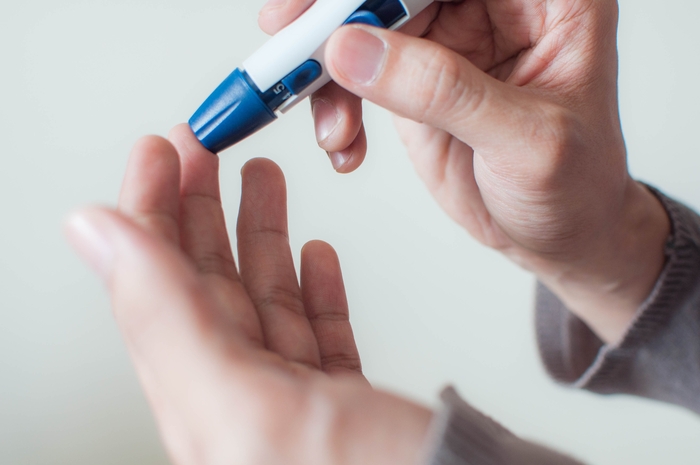
Ensure your health. Get tested today.
Convenient lab testing at your fingertips at more than 5,000 locations nationally. Consult with a doctor, or get tested on your own.

The A1C test (also known as a hemoglobin A1C (or HbA1C) test) measures your average blood sugar level over the last three months. This test is commonly used to help people with type 1 diabetes, type 2 diabetes, prediabetes, or gestational diabetes manage their conditions. This test may also be used in nondiabetic adults who have a family history of diabetes, are at a higher risk of developing diabetes, or have other conditions that affect their glucose tolerance. Hemoglobin A1C levels are also measured to see how well diabetes treatment is going.
While A1C is commonly used to evaluate diabetes (a chronic condition that affects your pancreas and insulin levels), you can have a high A1C result and still not be diabetic, according to the NIH.
The NIH defines hemoglobin A1C as a protein in red blood cells that carries oxygen from your lungs to the rest of your body. Blood sugar binds to hemoglobin in the blood cells. If your blood sugar level is high, a large amount of it will attach to hemoglobin, which is why this test is commonly used to check and manage diabetes.
The A1C test measures the amount of blood sugar that is attached to hemoglobin. According to the NIH, this diabetes test measures average blood sugar levels over the last three months because three months is the average lifespan of a red blood cell. High HbA1C levels indicate high blood sugar levels (hyperglycemia) and may mean that you have diabetes or prediabetes (a condition that is close to progressing into diabetes). Diabetes is not the only thing that can affect your A1C test. According to the NIH, the following factors can also change your A1C:
To get an A1C test you will have to give a blood sample. This is usually done at a laboratory or a healthcare professional's office. You can usually request this test yourself, or your doctor may request it if you have a high fasting glucose or risk factors that put you at higher risk for diabetes.
Reading your A1C levels may seem overwhelming if you're not familiar with them. But understanding your levels is important—levels outside a normal range should be discussed with a doctor so you can be sure to get any treatment you may need as soon as possible.
According to the Centers for Disease Control and Prevention, normal A1C levels are levels below 5.7%. This level means your average blood glucose levels are within normal limits and you likely don't have diabetes or prediabetes. But, if you are at increased risk for diabetes, your healthcare provider may still recommend regular testing in the future, according to the American Diabetes Association.
A slightly elevated A1C is between 5.7% and 6.4%, according to the CDC. This result may indicate that you have prediabetes. A high A1C is a level of 6.5% or above and may indicate diabetes, the CDC also notes.
High A1C levels do not always necessarily mean that you have diabetes. The NIH reports that high A1C causes include blood disorders like anemia, as well as liver disease, kidney failure, and sickle cell disease.
If your A1C level is high, your doctor may perform a blood glucose test to diagnose or rule out diabetes. If you do not have diabetes, your doctor may order another type of lab test to identify the root cause of high A1C.
The NIH states there are several potential causes of elevated HbA1C without diabetes. Knowing more about these conditions can help you determine whether you may be at risk and need treatment.
Anemia is a condition in which your blood is unable to carry enough oxygen to the rest of your body. Anemia is usually caused by iron deficiency, as iron is needed to make hemoglobin, reports the NIH. Next to diabetes, anemia is one of the top causes of high A1C.
Kidney problems usually occur when the kidneys become damaged and can no longer filter blood properly. This can cause high levels of sugar to build up in the bloodstream and contribute to high A1C, according to the NIH.
Triglycerides are a type of fat in your body that comes from foods such as butter and oils. According to the NIH, high triglycerides can affect your heart and blood health by causing elevated A1C.
The NIH states that your spleen is partly responsible for fighting infection, balancing body fluids, and destroying old and damaged blood cells. A spleen disorder can impair your body’s ability to destroy old blood cells, which can eventually lead to high A1C.
The thyroid is a small gland shaped like a butterfly that is located at the base of the front of your neck. Your thyroid is responsible for making a series of hormones that control your metabolism. According to a 2010 study published in Diabetes Care, thyroid disorders and abnormal thyroid levels can lead to elevated A1C in people who do not have diabetes.
Large doses of aspirin, HIV medications, and chronic use of opioids may contribute to elevated A1C in people with diabetes, according to a 2012 study published in the Indian Journal of Endocrinology and Metabolism.
You may have high A1C levels if you recently had a blood transfusion. According to a 2017 study in PloS One, blood that comes from a donor could result in high or lower A1C and affect your A1C readings.
Certain ethnic groups may have higher A1C levels than others. The NIH reports it is currently conducting clinical trials to determine why certain racial and ethnic groups may be predisposed to high A1C.
If you have high A1C levels, the NIH suggests that it’s possible to reduce your levels of this protein naturally through a series of healthy lifestyle behaviors.
According to the NIH, foods that are high in sugars and unhealthy fats may lead to a higher blood sugar level and A1C reading. Modify your diet to include more fruits, vegetables, lean proteins, nuts, seeds, fish, poultry, and whole grains. Eat fewer carbohydrates, including bread, candy, and ice cream. According to the Utah Department of Health, a diet high in carbohydrates will cause sugar to build up in the bloodstream at a high rate.
Exercise naturally reduces A1C by moving sugar from your bloodstream and into your muscles. The NIH recommends that you start exercising regularly on most days a week, even if you start small by walking for 15 minutes a day. Gradually increase your activity level week by week, and stick to doing activities you truly enjoy, such as dancing, gardening, and yoga.
An overall healthy lifestyle can reduce your risk for most illnesses and diseases, including diabetes, according to data from the NIH. Habits like, watching less television and spending more time outdoors in the sun being active, may help contribute to a healthy lifestyle. Reducing your alcohol intake and stopping smoking, while eating a higher amount of healthy foods, are also recommended by the NIH. Other important habits may include, getting plenty of quality sleep, and spending more time with positive, like-minded people who make you feel good about yourself.
An A1C test is a blood test that measures your average blood sugar level over the past three months. It's commonly used to manage diabetes and assess diabetes risk.
Yes, high A1C levels can occur without the presence of diabetes, due to factors like certain medications, anemia, kidney disease, high triglycerides, and spleen problems.
Normal A1C levels are below 5.7%. Levels between 5.7% and 6.4% may indicate prediabetes, and levels above 6.5% may indicate diabetes.
High A1C levels can be caused by factors like certain medications, anemia, kidney disease, high triglycerides, spleen problems, and certain ethnic backgrounds.
You can lower your A1C levels naturally through lifestyle changes, including diet modification to include healthier foods, regular exercise, reducing alcohol intake, stopping smoking, and maintaining a healthy sleep schedule.
Fasting can potentially help improve A1C levels, according to the NIH. When the body is fasting, it relies on stored glucose for a time, which can help stabilize high blood sugar levels. However, it's important to note that the impact of fasting can vary from person to person, and it's always a good idea to consult with a healthcare professional for personalized advice.
According to the Mayo Clinic, you do not need to fast or do anything else to prepare for the A1C test. They recommend that you eat and drink normally before your test.
Stress, especially prolonged stress, can have many negative effects on your body—including on your blood sugar, according to Healthline. They note that stress can raise blood sugar levels and increase insulin resistance. In turn, this can cause a high A1C result.
Although you can lower your blood sugar within minutes to hours, lowering your A1C will take longer. Because your A1C is an average of your blood sugar levels over a few months, it will take a least a few months to lower your A1C. There are several things you can start doing now to manage your diabetes and lower your A1C.

Convenient lab testing at your fingertips at more than 5,000 locations nationally. Consult with a doctor, or get tested on your own.